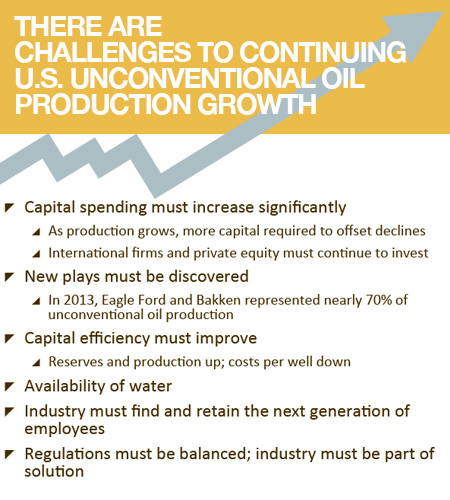Oil Shale's Future: Resources Aplenty, But Challenges Loom
“We’re in the first inning of a nine-inning game on the shale revolution in the United States,” Lance said, adding that technology can “improve the outlook over the years. This is a layer that is going to last for some time.”
Lance’s comments were driven by the fact that shale formations have quickly made the U.S. a major player in the natural gas sector in recent years.
More recently, Apache Corp.’s Chairman and Chief Executive Officer Steve Farris, in the annual Energy of Energy Conference held by Gardere Wynne Sewell LLP, told attendees that while there was still a significant amount of unrecovered fossil fuel in shale formations, there were a number of challenges confronting the industry that must be overcome if production from unconventional methods is to remain a major contributor of oil and gas for the United States.
Challenges in Maintaining Unconventional Oil Production
The issue of capital comes up quickly in any issue of the challenges facing the oil and gas industry. To maintain growth rates seen in production in recent years, the industry will have to have to be more efficient with capital. Simply put, the industry needs to get more bang for the buck just to keep production values in shale formations at existing levels, which are known for having steep decline rates. And for production to grow, considerably more capital will be required, Farris said. The costs per well using unconventional methods must be pushed lower, and production and reserves must be maximized.
Also, new shale formations will need to be discovered. Nearly 70 percent of oil production retrieved using unconventional methods is from just two shale formations, the Eagle Ford in South Texas – which contributed 47 percent of unconventional oil production in the United States in 2013 – and the Bakken in North Dakota, according to Apache.

123
View Full Article
WHAT DO YOU THINK?
Generated by readers, the comments included herein do not reflect the views and opinions of Rigzone. All comments are subject to editorial review. Off-topic, inappropriate or insulting comments will be removed.
- How Likely Is an All-Out War in the Middle East Involving the USA?
- Rooftop Solar Now 4th Largest Source of Electricity in Australia
- EU, Industry Players Ink Charter to Meet Solar Energy Targets
- US Confirms Reimposition of Oil Sanctions against Venezuela
- Analyst Says USA Influence on Middle East Seems to be Fading
- Brazil Court Reinstates Petrobras Chair to Divided Board
- Russian Ships to Remain Banned from US Ports
- EIB Lends $425.7 Million for Thuringia's Grid Upgrades
- Var Energi Confirms Oil Discovery in Ringhorne
- Seatrium, Shell Strengthen Floating Production Systems Collaboration
- An Already Bad Situation in the Red Sea Just Got Worse
- What's Next for Oil? Analysts Weigh In After Iran's Attack
- USA Regional Banks Dramatically Step Up Loans to Oil and Gas
- EIA Raises WTI Oil Price Forecasts
- Venezuela Authorities Arrest Two Senior Energy Officials
- Namibia Expects FID on Potential Major Oil Discovery by Yearend
- How Likely Is an All-Out War in the Middle East Involving the USA?
- Oil Markets Were Already Positioned for Iran Attack
- Is The Iran Nuclear Deal Revival Project Dead?
- Petrobras Chairman Suspended
- Oil and Gas Executives Predict WTI Oil Price
- An Already Bad Situation in the Red Sea Just Got Worse
- New China Climate Chief Says Fossil Fuels Must Keep a Role
- Oil and Gas Execs Reveal Where They See Henry Hub Price Heading
- Equinor Makes Discovery in North Sea
- Macquarie Strategists Warn of Large Oil Price Correction
- DOI Announces Proposal for Second GOM Offshore Wind Auction
- Standard Chartered Reiterates $94 Brent Call
- Chevron, Hess Confident Embattled Merger Will Close Mid-2024
- Analysts Flag 'Remarkable Feature' of 2024 Oil Price Rally


